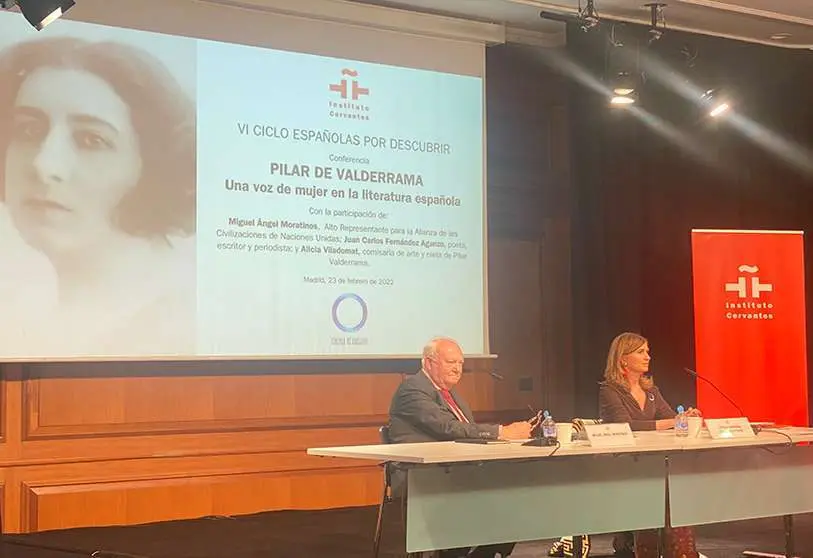Machado's secret love

Who is this Valderrama, so forgotten in literature books, and so present in Machado's most intimate letters? To remedy this oblivion, the Circulo de Orellana placed her in the magical number 50 of its series of Spanish women to be discovered.
The United Nations High Representative for the Alliance of Civilisations, former Foreign Minister and career diplomat, Miguel Ángel Moratinos, was in charge of placing a woman of letters with her own weight in the place she earned for herself. Speaking from the Cervantes Institute in Madrid, Moratinos vindicated Pilar de Valderrama in her life and work, which goes beyond Guiomar, Antonio Machado's love and muse. "Diplomacy and culture must go hand in hand more and more in the world we live in," said the former minister, who to a certain extent was "returning home" as he was the driving force behind the current location of the headquarters of the Institute, dedicated to the promotion of Spanish language and culture abroad.
It happened in Segovia, where the French teacher found a place after Soria and Baeza. It was in 1928 at the Hotel Comercio where two lovers of letters met and exchanged glances and interests. From that day on, the two and a half hour train journey between the Aqueduct and Madrid would mark the long awaited meetings between Antonio and Pilar. Intimate dates and secrets. He plays the role of notary public of the hidden love when he reveals the 36 letters Machado sent to the one he called his goddess. He compares them - "they write them to tell each other, and so their love exists - to the lovers' letters between Albert Camus and María Casares, another couple deeply in love who lived their passion in secret.
Moratinos is a great connoisseur of the work and influence of Camus, the French-Algerian and Menorcan Nobel laureate," he adds, "because of his family background and now because of the Mediterranean Literary Encounters that bring together every two years the most prominent intellectuals from the northern and southern shores.
What is a high-ranking representative of the UN doing talking about Valderrama here? Moratinos himself wondered, revealing the family connection between the Moratinos and Valderrama families, to relate his other literary and even political interests with personal ties. Pilar was soon left fatherless and after leaving boarding school she married immediately, had three children and turned theatre and literature into her true passions.
She was an author of late modernism and participated in the meetings of the progressive women of the Licuen Club of Madrid (a unique and pioneering organisation in Spain, the first cultural and secular organisation, created by and for women in 1926, which fought for the social and legal equality of their gender). She published outstanding works such as Huerto cerrado (the book that links her to Machado) and Holocausto. Her poetry anthology Evocación (Evocation) was published just two years ago. An admirer of Rubén Darío, she was also associated with Jorge Guillén and Unamuno, with Concha Espina and Juan Ramón Jiménez. Married to a man of the theatre, Pilar lived her love affair with the great poet in the gardens of Moncloa. No one knows exactly the limits of that love that ended up lost among the exteriors of the war.
"From sea to sea, between the two the war", writes Antonio Machado in his last poem, facing the Mediterranean, thinking that his beloved has escaped to Estoril. Guiomar for Machado, for the history of poetry and secret loves, is now vindicated with her own name as an author.
Also taking part in this literary recovery session at the Cervantes were her granddaughter Alicia Viladomat, who preserves her personal memory, letters and writings, and the literary critic Carlos Aganzo, a profound connoisseur of her work.
"Yes, I am Guiomar" will be her posthumous autobiographical book to confirm a love story, which in Moratinos' words should not cloud the literary position and professional biography of a woman with her own voice; a case that shows us that "spaces must be created for women's voices to be heard". Another Spaniard "to be discovered", and whom the Circulo Orellana places on the pedestal she deserves to be shown in her own light.









